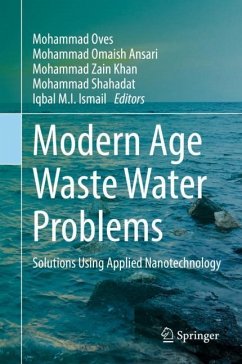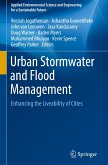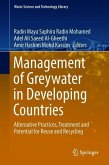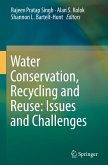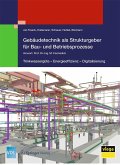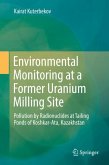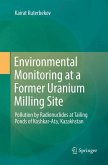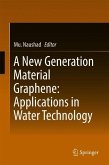Modern Age Waste Water Problems
Solutions Using Applied Nanotechnology
Herausgegeben:Oves, Mohammad; Ansari, Mohammad Omaish; Zain Khan, Mohammad; Shahadat, Mohammad; M.I. Ismail, Iqbal
Modern Age Waste Water Problems
Solutions Using Applied Nanotechnology
Herausgegeben:Oves, Mohammad; Ansari, Mohammad Omaish; Zain Khan, Mohammad; Shahadat, Mohammad; M.I. Ismail, Iqbal
- Gebundenes Buch
- Merkliste
- Auf die Merkliste
- Bewerten Bewerten
- Teilen
- Produkt teilen
- Produkterinnerung
- Produkterinnerung
This book presents a picture of the advances in the research of theoretical and practical frameworks of wastewater problems and solutions. The book deals with a basic concept and principles of modern biological, chemical and technical approaches to remediate various hazardous pollutants from wastewater. The latest empirical research findings in wastewater treatment are comprehensively discussed. Examples of low-cost technologies are also included. The book is written for professionals, researchers, academics and students wanting to improve their understanding of the strategic role of environmental protection and advanced applied technologies.…mehr
Andere Kunden interessierten sich auch für
![Urban Stormwater and Flood Management Urban Stormwater and Flood Management]() Urban Stormwater and Flood Management113,99 €
Urban Stormwater and Flood Management113,99 €![Management of Greywater in Developing Countries Management of Greywater in Developing Countries]() Management of Greywater in Developing Countries105,99 €
Management of Greywater in Developing Countries105,99 €![Water Conservation, Recycling and Reuse: Issues and Challenges Water Conservation, Recycling and Reuse: Issues and Challenges]() Water Conservation, Recycling and Reuse: Issues and Challenges121,99 €
Water Conservation, Recycling and Reuse: Issues and Challenges121,99 €![Gebäudetechnik als Strukturgeber für Bau- und Betriebsprozesse Gebäudetechnik als Strukturgeber für Bau- und Betriebsprozesse]() Treeck, van, ChristophGebäudetechnik als Strukturgeber für Bau- und Betriebsprozesse89,99 €
Treeck, van, ChristophGebäudetechnik als Strukturgeber für Bau- und Betriebsprozesse89,99 €![Environmental Monitoring at a Former Uranium Milling Site Environmental Monitoring at a Former Uranium Milling Site]() Kairat KuterbekovEnvironmental Monitoring at a Former Uranium Milling Site97,99 €
Kairat KuterbekovEnvironmental Monitoring at a Former Uranium Milling Site97,99 €![Environmental Monitoring at a Former Uranium Milling Site Environmental Monitoring at a Former Uranium Milling Site]() Kairat KuterbekovEnvironmental Monitoring at a Former Uranium Milling Site97,99 €
Kairat KuterbekovEnvironmental Monitoring at a Former Uranium Milling Site97,99 €![A New Generation Material Graphene: Applications in Water Technology A New Generation Material Graphene: Applications in Water Technology]() A New Generation Material Graphene: Applications in Water Technology161,99 €
A New Generation Material Graphene: Applications in Water Technology161,99 €-
-
-
This book presents a picture of the advances in the research of theoretical and practical frameworks of wastewater problems and solutions. The book deals with a basic concept and principles of modern biological, chemical and technical approaches to remediate various hazardous pollutants from wastewater. The latest empirical research findings in wastewater treatment are comprehensively discussed. Examples of low-cost technologies are also included.
The book is written for professionals, researchers, academics and students wanting to improve their understanding of the strategic role of environmental protection and advanced applied technologies.
The book is written for professionals, researchers, academics and students wanting to improve their understanding of the strategic role of environmental protection and advanced applied technologies.
Produktdetails
- Produktdetails
- Verlag: Springer / Springer International Publishing / Springer, Berlin
- Artikelnr. des Verlages: 978-3-030-08282-6
- 1st edition 2020
- Seitenzahl: 376
- Erscheinungstermin: 25. Juni 2019
- Englisch
- Abmessung: 241mm x 160mm x 26mm
- Gewicht: 710g
- ISBN-13: 9783030082826
- ISBN-10: 3030082822
- Artikelnr.: 54557099
- Herstellerkennzeichnung
- Books on Demand GmbH
- In de Tarpen 42
- 22848 Norderstedt
- info@bod.de
- 040 53433511
- Verlag: Springer / Springer International Publishing / Springer, Berlin
- Artikelnr. des Verlages: 978-3-030-08282-6
- 1st edition 2020
- Seitenzahl: 376
- Erscheinungstermin: 25. Juni 2019
- Englisch
- Abmessung: 241mm x 160mm x 26mm
- Gewicht: 710g
- ISBN-13: 9783030082826
- ISBN-10: 3030082822
- Artikelnr.: 54557099
- Herstellerkennzeichnung
- Books on Demand GmbH
- In de Tarpen 42
- 22848 Norderstedt
- info@bod.de
- 040 53433511
Dr. Mohammad Oves, is an Assistant Professor at Biological Science department and the Center of Excellence in Environmental Studies of King Abdulaziz University, Jeddah, Kingdom of Saudi Arabia. Dr. Oves received his M.Sc. & Ph.D. (Microbiology) from Aligarh Muslim University, India. He has more than seven years research experience on the different environmental related research projects like SWINGS (Safeguarding Water Resources in India with Green and Sustainable Technology) International FP-7 EU project and "Green synthesis of nano-materials from the plant and bacterial extract and application as anticancer and antibacterial agent" funded by CSIR, India. He has published 85 scientific papers, including original research articles, review articles, and book chapters in reputed international publishers. He has also gained 2850 citations on Google scholar. His interest in application of Microbiology coupled with Environmental Sciences, Nanoscience, and BiomedicalSciences. He is intensely involved in research activities focusing on antimicrobial activities of newly synthesized drugs and nanomaterials. Dr. Mohammad Omaish Ansari obtained his Ph.D. degree from Applied Chemistry, Aligarh Muslim University in 2012. He is currently working as Assistant Professor in the Center of Nanotechnology, King Abdulaziz University, Saudi Arabia. Prior to joining King Abdulaziz University, he also worked as Assistant Professor at Yeungnam Univeristy, South Korea, where he was actively involved in teaching and research activities. He has published research papers in the field of conducting polymers, gas sensors, energy storage materials, photocatalysis, adsorptive removal of pollutants and nanocomposites in the journals of high repute and has also presented his work in national and international conferences. Mohammad Shahadat (Md. Shad) is completed doctorate and M.Sc. (Analytical Chemistry) from Aligarh Muslim University, Aligarh, India. He has completed his Post Doctoral Fellow in the Division of Environmental Technology, Universiti Sains Malaysia (USM) Malaysia. He has been published over 40 research articles and 14 book chapters in the journals of international repute. Recently he has been working under DST-SERB Young scientist scheme awarded from DST-SERB, Govt. of India for a research project at Indian Institute of Technology (IIT) Delhi, India jointly at the Department of Biochemical Engineering & Biotechnology and Department of Textile Technology. His research interests are synthesis, characterizations and analytical applications of clay-based low-cost adsorbent and Polyaniline-CNT/Graphene-supported biodegradable nanocomposite materials and their significant applications in various fields, including wastewater treatment, electromagnetic interference (EMI) shielding, UV-protection as well as their paramedical applications. Dr. Mohammad Zain Khan, Ph.D., isan Assistant Professor of Industrial Chemistry at the Aligarh Muslim University, Aligarh, India. He did his Masters in Industrial Chemistry and Ph.D. in Environmental Chemistry (Wastewater bioremediation) from AMU Aligarh. He was awarded the prestigious Erasmus Mundus Fellowship by the European Union to work at the prestigious University College of London as PDF. He has also worked at IIT Delhi as Project Scientist under the DST Fast Track Young Scientist Scheme. His main area of interest is the bioremediation of organic compounds along with energy recovery in the form of electricity, hydrogen or methane using Bioelectrochemical Systems (BESs). Currently, he is running research projects funded by the DST and UGC funding bodies of the government of India and supervising Ph.D. and MPhil candidates. He has published some very interesting research articles, including review articles in peer-reviewed journals and presented papers in various national and international conferences. Professor Iqbal MI Ismail, (M. Phil & Ph.D. Chemistry, University of Southampton, U.K.), is a Professor of Physical Chemistry, Director of Center of Excellence in Environmental Studies, Center of Talent and Creativity and Deputy Director of Intellectual Property, Investment Administration and Vice Dean for Housing and Catering Deanship of Students Affairs of the King Abdulaziz University, Jeddah, Kingdom of Saudi Arabia. He has been teaching Chemistry to postgraduate students for last 26 years and has research experience of about more than 30 years. He has contributed more than 100 national and international scientific publications. He is associated with several scientific and administrative bodies.
Introduction.- 1. Absorptive removal and recovery of heavy metal ions from aqueous solution/effluents using conventional and non-conventional materials.- 2. Bioremediation of Oil-Spills from Shore Line Environment.- 3. Fabrication of polyaniline supported nanocomposites sensing applications for the detection of environmental pollutants.- 4. Graphene and its composites: Applications in Environmental Remediation.- 5. Nano-composite materials for wastewater decontamination Photocatalytic decontamination of organic pollutants using advanced materials (Recent advancement in waste water decontamination Removal and Recovery of Heavy Metal Ions Using Natural Adsorbents.- 6. Water purification by nanotechnological approach: Challenges and future prospects.- 7. Green nanotechnology involvement in water and wastewater treatment.- 8. Advanced nanomaterial for metal ions removal from aqueous solutions.- 9. Graphene and carbon nanobased nanomaterials application wastewater treatment.- 10. Application of cellulose nanomaterials in water treatment technologies.- 11. Amorphous nanomaterial application in removal and recovery of heavy metals from water.- 12. Nanofiltration for water purification.- 13. Sewage treatment using nanotechnology and disposal of waste nanomaterials.- 14. The recent nano- and biotechnological advances to the removal of toxic contaminants from wastewater streams.- 15. Conclusions.
Introduction.- 1. Absorptive removal and recovery of heavy metal ions from aqueous solution/effluents using conventional and non-conventional materials.- 2. Bioremediation of Oil-Spills from Shore Line Environment.- 3. Fabrication of polyaniline supported nanocomposites sensing applications for the detection of environmental pollutants.- 4. Graphene and its composites: Applications in Environmental Remediation.- 5. Nano-composite materials for wastewater decontamination Photocatalytic decontamination of organic pollutants using advanced materials (Recent advancement in waste water decontamination Removal and Recovery of Heavy Metal Ions Using Natural Adsorbents.- 6. Water purification by nanotechnological approach: Challenges and future prospects.- 7. Green nanotechnology involvement in water and wastewater treatment.- 8. Advanced nanomaterial for metal ions removal from aqueous solutions.- 9. Graphene and carbon nanobased nanomaterials application wastewater treatment.- 10.Application of cellulose nanomaterials in water treatment technologies.- 11. Amorphous nanomaterial application in removal and recovery of heavy metals from water.- 12. Nanofiltration for water purification.- 13. Sewage treatment using nanotechnology and disposal of waste nanomaterials.- 14. The recent nano- and biotechnological advances to the removal of toxic contaminants from wastewater streams.- 15. Conclusions.
Introduction.- 1. Absorptive removal and recovery of heavy metal ions from aqueous solution/effluents using conventional and non-conventional materials.- 2. Bioremediation of Oil-Spills from Shore Line Environment.- 3. Fabrication of polyaniline supported nanocomposites sensing applications for the detection of environmental pollutants.- 4. Graphene and its composites: Applications in Environmental Remediation.- 5. Nano-composite materials for wastewater decontamination Photocatalytic decontamination of organic pollutants using advanced materials (Recent advancement in waste water decontamination Removal and Recovery of Heavy Metal Ions Using Natural Adsorbents.- 6. Water purification by nanotechnological approach: Challenges and future prospects.- 7. Green nanotechnology involvement in water and wastewater treatment.- 8. Advanced nanomaterial for metal ions removal from aqueous solutions.- 9. Graphene and carbon nanobased nanomaterials application wastewater treatment.- 10. Application of cellulose nanomaterials in water treatment technologies.- 11. Amorphous nanomaterial application in removal and recovery of heavy metals from water.- 12. Nanofiltration for water purification.- 13. Sewage treatment using nanotechnology and disposal of waste nanomaterials.- 14. The recent nano- and biotechnological advances to the removal of toxic contaminants from wastewater streams.- 15. Conclusions.
Introduction.- 1. Absorptive removal and recovery of heavy metal ions from aqueous solution/effluents using conventional and non-conventional materials.- 2. Bioremediation of Oil-Spills from Shore Line Environment.- 3. Fabrication of polyaniline supported nanocomposites sensing applications for the detection of environmental pollutants.- 4. Graphene and its composites: Applications in Environmental Remediation.- 5. Nano-composite materials for wastewater decontamination Photocatalytic decontamination of organic pollutants using advanced materials (Recent advancement in waste water decontamination Removal and Recovery of Heavy Metal Ions Using Natural Adsorbents.- 6. Water purification by nanotechnological approach: Challenges and future prospects.- 7. Green nanotechnology involvement in water and wastewater treatment.- 8. Advanced nanomaterial for metal ions removal from aqueous solutions.- 9. Graphene and carbon nanobased nanomaterials application wastewater treatment.- 10.Application of cellulose nanomaterials in water treatment technologies.- 11. Amorphous nanomaterial application in removal and recovery of heavy metals from water.- 12. Nanofiltration for water purification.- 13. Sewage treatment using nanotechnology and disposal of waste nanomaterials.- 14. The recent nano- and biotechnological advances to the removal of toxic contaminants from wastewater streams.- 15. Conclusions.

